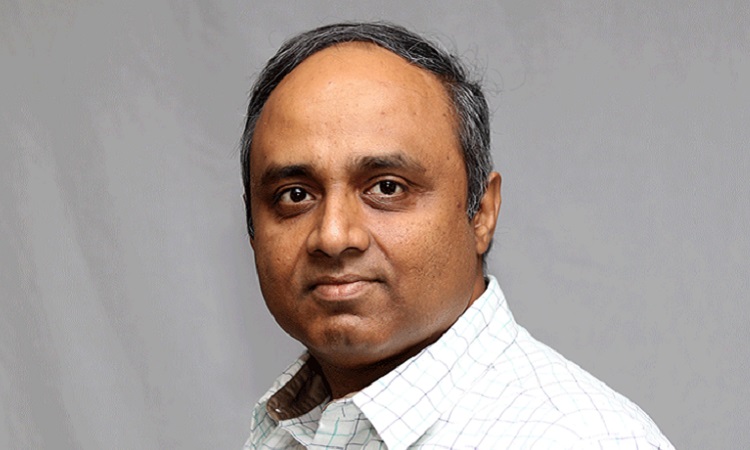
KEYNOTE SERIES
Snehasis Mukhopadhyay
(Professor ,Purdue University)
Bio: Dr. Snehasis Mukhopadhyay is a Professor in the Department of Computer and Information Science at Purdue University, Indianapolis, USA. He received his Ph.D. from Yale University, USA, and a Master’s degree (with a Gold Medal) from the Indian Institute of Science, Bangalore, India. He received a CAREER award from the United States National Science Foundation for integrating research and education. He has continuously received research funding from United States government agencies including National Science Foundation, National Institutes of Health, National Oceanic and Atmospheric Administration, and United States Department of Agriculture. He has twice received the Indiana University Trustees Teaching Awards (TTA) in the years 2014 and 2017. He has provided extensive professional services including being National Science Foundation grant proposal review panelist on numerous occasions, and being the General Chair of the 2016 ACM International Conference on Information and Knowledge management (ACM CIKM). In the year 2023, he served as an invited member of the National Academies Panel on Assessment of Military Information Sciences Research Program at the Army Research Laboratory, Aberdeen, Maryland. His current research interests are in the areas of Artificial Intelligence, Machine Learning, Interactive Data Science, and Computer/Computational Science Education Research. He has published more than 100 research papers in these areas.
Title of Talk: Interactive Artificial Intelligence and Its Applications
Abstract: As information technology gradually infiltrates highly specialized socio-technological domains such as healthcare and education, a crucial question remains as to whether human experts with advanced training and experience-driven intuitive mental models or AI systems with their empirical highly nonlinear data-driven models are to be preferred in making decisions. This is a question for which vigorous debate is going on extensively in society. We, however, take the viewpoint that it is not an either-or choice, but for the most successful systems, a seamless integration of human intuition with machine learning based empirical models is necessary. This is the underlying spirit of our proposed human-in-the-loop, interactive machine learning (IML) methodology. In the first part of this talk, we will discuss a computational framework for learning happening between a machine (an algorithm) and a human user. This framework is termed as “Interactive Artificial Intelligence”. In the second part of the talk, we will discuss some applications of interactive artificial intelligence to socio-technological problems arising in many domains. Such applications include Smart Health and Smart Education.

Eve Psalti
(Senior Director, Artificial Intelligence Engineering at Microsoft)
Bio: Eve Psalti is 20-year year tech and business leader, currently the Senior Director at Microsoft’s Azure AI engineering organization responsible for scaling and commercializing artificial intelligence solutions. She was previously the Head of Strategic Platforms at Google Cloud where she worked with F500 companies helping them grow their businesses through digital transformation initiatives.
Prior to Google, Eve held business development, sales and marketing leadership positions at Microsoft and startups across the US and Europe leading 200-people teams and $600M businesses.
A native of Greece, she holds a Master’s degree and several technology and business certifications from London Business School and the University of Washington. Eve currently serves on the board of WE Global Studios, a full-stack startup innovation studio supporting female entrepreneurs.
Title of Talk: Engineering the Future: Harnessing the Power of AI to Drive Business Growth
Abstract: As AI becomes integral to modern software development, developers are uniquely positioned to drive innovation by embedding intelligence into business workflows.
This session dives into the practical aspects of building, customizing, and deploying AI solutions at scale—equipping developers with the tools and techniques to turn models into impact.
We’ll cover:
Applied AI in Business Workflows: How developers can use AI to automate tasks, optimize performance, and integrate real-time insights into apps and services.
Model Catalog Access & Deployment: Exploring pre-built, production-ready models that developers can fine-tune and deploy quickly for common use cases.
Finetuning and Customization: Using Azure AI’s tools to adapt foundation models with domain-specific data for higher accuracy and relevance.
Responsible AI by Design: Implementing fairness, transparency, and governance principles through accessible SDKs and APIs to ensure ethical AI development.
Through real-world examples and live demonstrations, attendees will leave with a clear understanding of how to incorporate Azure AI into their development workflows—from experimentation to production.
Mahasweta Sarkar
(Professor ,San Diego State University)
Bio: Dr. Mahasweta Sarkar is a Professor in the Department of Electrical and Computer Engineering at San Diego State University (SDSU). She earned her Ph.D. from the University of California, San Diego. Her research focuses on wireless networks, with a particular emphasis on developing artificial intelligence-driven MAC layer algorithms for applications spanning precision agriculture, healthcare, and brain-computer interfaces.
Dr. Sarkar has authored over 120 research articles, several of which have received best-paper awards, and holds one patent. She has contributed to more than $100 million in federally funded grant projects. Her research lab, the Wireless Networks and Communication (WINC) Lab, hosts undergraduate and graduate students, post-doctoral fellows, and visiting faculty members from across the globe.
She serves as the Chair of the Technical Program Committees for multiple Tier-1 IEEE conferences and as a guest editor for several leading technical journals. Among her numerous accolades, Dr. Sarkar received the President’s Leadership Award at SDSU (2010), the Faculty Excellence Award in Diversity and Inclusion (2021), and the Distinguished Faculty Award (2023–2024), one of the university’s highest honors recognizing extensive contributions to her discipline.
Dr. Sarkar is deeply committed to outreach programs that inspire and support the next generation of women scientists and individuals from underrepresented communities. She founded and chaired the Diversity, Equity, and Inclusion (DEI) Committee in SDSU’s College of Engineering and served as the College’s liaison to both the University’s and Senate’s Diversity Councils.
She is a recipient of a Fulbright Specialist Fellowship (2021–2024), awarded by the U.S. Department of State’s Bureau of Educational and Cultural Affairs, which has allowed her to expand her international academic and outreach collaborations.
Currently, Dr. Sarkar serves as the Senior Associate Dean of SDSU Global Campus (formerly the College of Extended Studies), where she is spearheading efforts to bring SDSU’s degree programs to a global audience and establish a significant international presence for the university.
Title of Talk : Intelligent Systems Connecting the Unconnected
Abstract: In a rapidly evolving digital age, connectivity has become the cornerstone of progress, innovation, and inclusion. However, despite transformative advancements, 46% of the world’s population remains disconnected from the internet and the opportunities it offers. In this keynote address, “Intelligent Systems Connecting the Unconnected,” we will explore the pivotal role advanced telecommunications plays in bridging this gap and transforming the way the world interacts.
We begin by delving into the revolutionary impact of the Internet of Things (IoT), where advanced telecommunications seamlessly connect devices, systems, and environments, enabling smarter cities,
healthcare, and industries. Beyond things, the keynote underscores the pressing need to bring unconnected populations online, discussing the societal, economic, and cultural shifts enabled by universal access to digital infrastructure.
Expanding the lens to the future, we examine the groundbreaking potential of quantum computing to
redefine the very fabric of communication. With unprecedented computational power, quantum networks
promise ultra-secure communication and faster data transmission, revolutionizing fields from national
security to global collaboration.
Finally, we explore how artificial intelligence (AI) is set to augment connectivity further. AI-powered communication systems can optimize networks, deliver personalized user experiences, and break down
language barriers, creating a truly global and inclusive communication landscape.
“Intelligent Systems Connecting the Unconnected” emphasizes the transformative power of technology not just to connect devices and systems, but to empower individuals, bridge societal divides, and foster a more inclusive and innovative global community.
Sara Abdali
(Senior Researcher, Microsoft)
Bio : Dr. Abdali is a Senior Researcher at Applied Sciences Group (ASG) working on a variety of NLP and multimodal tasks including customization and distillation of Microsoft Turing and Microsoft Phi LLMs/SLMs for downstream tasks, multitask architectures, multimodal generative models, causa and more recently multimodal conversational agents. Before joining Microsoft, she was a postdoctoral CIFellow at Georgia Tech, working on my NSF funded project, “Adversarially robust multimodal misinformation detection”. She earned her Ph.D. from the University of California, Riverside (UCR), where she received the Dean’s Distinguished Fellowship Award , which fully funded her studies. During the Ph.D., she mainly worked on misinformation detection leveraging multilinear (tensor) algebra along with a variety of NLP and vision techniques. She also worked on Deepfake video detection and development of text augmentation techniques in few-shot settings. In fall 2020, she completed a research internship at Lenovo Research, where the worked on deep learning-based image enhancement. In summer 2021, she finished another internship at Microsoft where she worked on development of cutting-edge NLP techniques.
Tiltle of the talk: Philosophy-Inspired NLP to Foster Innovation
Abstract: Investigating NLP through a philosophical lens has recently caught researchers’ attention, as it connects computational methods with classical schools of philosophy. This talk explores the existing body of work on philosophy-driven NLP and introduces a novel philosophical approach inspired by the Hegelian Dialectic to foster self-reflection in large language models (LLMs). By employing a self-dialectical method, these models can simulate internal critiques and synthesize new ideas by reconciling and unifying conflicting viewpoints. The talk also explores the models’ ability to generate novel ideas from an initial proposition. Additionally, Multi-Agent strategies will be explored as tools for assessing the validity and novelty of these ideas, proving especially valuable when domain experts are unavailable.

Luyuan Fang
(CEO and Founder, Curative AI)
Bio: Dr. Luyuan Fang is CEO and Co-Founder of Curative AI, Inc. where she leads a fast-growing team on a mission to redefine clinical operations and care delivery through AI and data, improving patient outcomes, assisting providers with AI Clinical Decision Support, and delivering AI-First RCM solutions to automate healthcare workflows across the entire patient journey. Focusing on the rapid creation of industry-shaping innovative AI and data products and having secured early strategic customers, under Luyuan’s leadership, Curative AI achieved cash-flow positivity in less than 12 months, with signed customer contracts for $35+M projected 2025 revenues.
Prior to founding Curative AI, Dr. Fang built and led three world-class AI and Data organizations from the ground up, successfully productizing AI, LLMs, and data platforms at massive scale across three verticals: 1) Healthcare, as Chief AI Officer at Change Healthcare (now UnitedHealthcare/Optum Insight); 2) Prescription Drug Market, as Chief AI and Data Officer at Prescryptive Health; and 3) Online Travel Marketplace, as Founder and Head of Expedia Group AI Labs. She has also held senior technical and leadership roles at Microsoft Azure, eBay, Cisco Systems, and AT&T.
Dr. Fang holds a Ph.D. in Computer Science with a focus on AI and Neural Networks. She is the inventor of 10 granted U.S. patents and author of over 100 technical publications. A frequent keynote speaker and conference chair in global AI and networking communities, she also serves on the boards of multiple Healthcare AI startups.
Title of the talk: Ushering in the AI-First Healthcare Era: Reimagining Revenue Cycle Management and Clinical Operations
Abstract: Operational inefficiencies, workforce shortages, and outdated technologies are key contributors to the high cost and low efficiency of the U.S. healthcare system. This talk will focus on how AI is transforming healthcare operations and technology infrastructure to drive greater efficiency, reduce operational costs, and improve patient outcomes.
By adopting an AI-First approach, we are redefining core processes, workflows, automation, and the overall healthcare experience. Our end-to-end AI-powered solutions—leveraging Machine Learning (ML), Large Language Models (LLMs), and Agentic AI—are developed through rigorous scientific and engineering practices. These solutions significantly reduce system complexity, manual workloads, error-prone processes, and resource constraints.
Key applications of our AI-First systems include Revenue Cycle Management (RCM), clinical documentation automation, data tracking and AI-driven analytics for value-based care, and personalized support for diagnosis and treatment. We will illustrate our approach and impact with a real-world use case in clinical operations and RCM for Autism treatment.

Phillip Bradford
(University of Connecticut, Stamford, USA)
Bio: Dr. Phillip G. Bradford is on the faculty at the University of Connecticut. He is the director of the computer science program at the University of Connecticut in Stamford.
He is a computer scientist with extensive experience in academia and industry. Phil was a post-doctoral fellow at the Max-Planck-Institut für Informatik, he earned his PhD at Indiana University, an MS form the University of Kansas, and a BA from Rutgers University. He was on the faculty at Rutgers Business School and the University of Alabama’s Engineering School. He worked for BlackRock, Reuters Analytics, founded a startup and worked with a number of early stage firms. He was a Principal Architect for General Electric. Phil has a deep belief in bringing real research to practice. This is the root of his entrepreneurial perspective. Phil has a handful of best-in-class results. His Erdős Number is 2. He has given over 70 talks in 10 countries and he is the author or co-author of over 70 articles.
Title of the talk: AI and IoT: Small Clever devices with great power.
Important Deadlines-
| Full Paper Submission: | 11th April 2025 |
| Acceptance Notification: | 23rd April 2025 |
| Final Paper Submission: | 15th May 2025 |
| Early Bird Registration: | 27th April 2025 |
| Presentation Submission: | 15th May 2025 |
| Conference: | 28 - 30 May 2025 |
Previous Conference-
Sister Conferences-
Announcements-
-Best Paper Award will be given for each track.
-Conference Record Number- 65859



